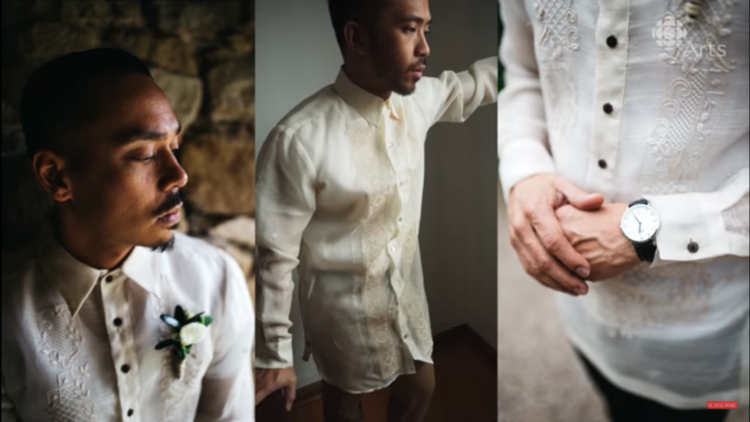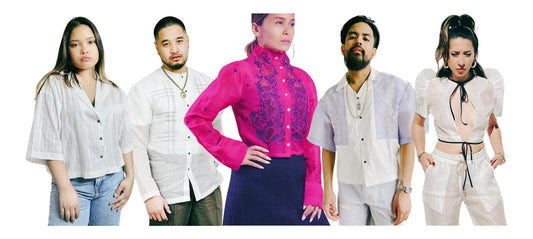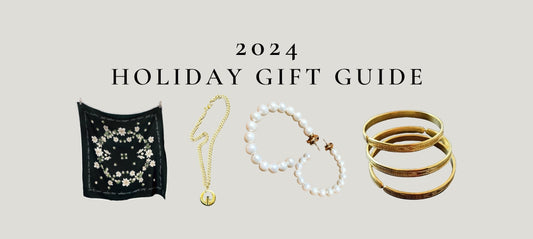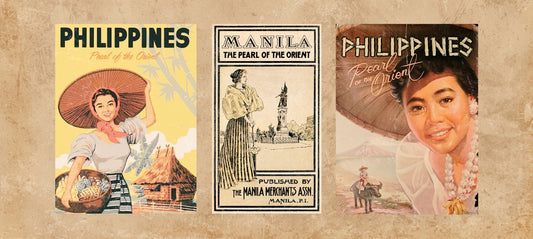“Filipiniana clothing is a way that we can express our culture without having to talk about it — you just wear it. You wear your culture on your sleeve.”
VINTA Founder and Creative Director Caroline Mangosing took CBC Arts on a jaunt through Divisoria in Manila, Philippines, as she told the story of her VINTA Gallery journey.
VINTA is a bespoke, custom made and ready to wear Filipiniana clothing, based in Toronto, Canada, but made in Manila. From terno-inspired tops and barong dresses to custom Filipiniana wedding gowns and hand-loomed Ifugao skirts, most of the embroidery is done traditionally where they’ve been made. “Mostly I’m inspired by the fabric,” Caroline adds, in the CBC Arts mini documentary. “I look at a lot of Indigenous fabric, so fabric that’s hand woven here in the Philippines. I like to start with that.”

In the video, Caroline highlights distinguishing elements of the men’s traditional garment, the Barong Tagalog, adding that the fabric (which is made of pineapple fiber) and its embellishments (embroidered at the front) is what makes the barong so uniquely “Filipino.” For the women’s garment, it’s the butterfly sleeves. Even in history, she says, “the sleeves were what made the dress.”
But where to buy Filipino clothing in Toronto? Is there even a Filipiniana dress store in Toronto?
“There’s about 350,000 Filipinos in Toronto and there’s not a single shop where you can buy barongs and ternos for weddings or for any special occasions,” Caroline adds. At the time, Caroline was the founder and executive director of the Kapisanan Philippine Centre for Arts and Culture, located in downtown Toronto. With over 62% of the Filipino population in Canada living in Toronto, naturally people would call Kapisanan to ask for Filipino cultural clothing — that’s where VINTA was born.
These days, however, as Caroline points out in the doc, Filipino traditional clothing appears very “costume-y,” with a lot of bright colors and very ceremonial embellishments. On top of that, politics changed the way Filipinos wore traditional clothing since the barong and the terno has become closely associated with the Marcos dictatorship — they wore it all the time.

Philippine president Ferdinand Marcos standing with his wife Imelda Marcos, Election day 1965
“After they stepped down, people didn’t want to wear it anymore — it just became uncool,” Caroline adds. “And now that it’s coming back into fashion, it’s not very fashionable.”
Caroline’s vision for VINTA is to bring back traditional Filipino clothing pieces, but to make it more modern — something the Filipino diaspora in Toronto and all of North America can wear to weddings and parties, but also in their everyday lives.
Born in Manila, Caroline remembers her mother being “really crafty,” as she herself owned a children’s clothing manufacturing company in the Philippines. Her family then immigrated to Los Angeles, California, and then they moved on to Vancouver when she was 16.

Caroline and her family in LA
“Growing up in Vancouver, I was pretty devoid of anything Filipino. I felt a lot of culture shock, and I think that’s when I started my ‘dig,’” she adds. She started taking women’s studies, reading books by people of color and just trying to figure out who she was — starting from her culture.
After a couple of years, Caroline sold everything she owned and bought a one-way ticket to Toronto, Canada. From there, a few years later, she founded Kapisanan and, soon after, VINTA Gallery.
“I think that what I’m trying to do is continue the craftsmanship of the hand embroidery and the hand weaving and make it available to the rest to the world,” Caroline says. “I love how I was able to find a nice little niche in fashion — but I feel like that’s part of my family legacy.”
Shop VINTA’s modern Filipiniana dresses online here.








